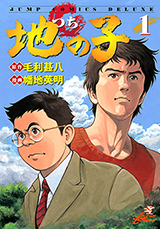About two guys who rediscover the world of the old and traditional Japanese agricultural ways.
3 Volumes (Complete)

Shuntaro Natsume, a young government official, has a new assignment: enticing more young people to choose agriculture as their life's calling. Considering that much of Japan's food is imported, that the government makes all kinds of rules that make sense to them in Tokyo but not to the farmers in the countryside and that an extremely small percentage of agricultural high school graduates actually end up working in the field, his task seems impossible to fulfill. But Natsume is not one to quit easily and gets a teaching job at one of the agri high schools. He soon discovers that most of the students are not only uninterested in agriculture, but also have low self-esteem, feeling that this low-ranking high school was the only kind they could get into, while the increasingly aging farmer population of the surrounding villages has trouble selling their produce even at a huge discount. Can Natsume really make a difference here?
Unlike Arakawa's Silver Spoon (which I love, by the way), this manga does not paint a rosy picture of Japanese agriculture. It shows things as they are: a world in which people want perfect looking vegetables at low prices, children don't know where food comes from before it reaches their plate and farmers are quitting left and right because they cannot support themselves. However, the message is still very much a positive one, showing that if farmers band together, get creative, work hard and promote what they do, the rest of the world will not stay indifferent. Things can change for the better.
The problems described in this series not only affect Japan, but most of the post-industrialized countries in the world. This is further underscored with special extras included at the end of the French edition: in volume 1, there is an essay comparing agricultural issues in Japan and Limousin, France. The end of volume 2 has personal stories of several Japanese farmers.
I gave the series a 9 instead of the perfect 10 score because it's only three volumes long. I'm still searching for the last volume which is out of print in France, but feel the series could have gone on for much longer. In the middle of volume 2, Natsume goes on a journey to visit as many farmers as possible so I don't see how everything could have been successfully wrapped up in just one more volume. I guess a series with such a serious topic wouldn't interest too many readers, so was probably dropped due to low readership. I'm honestly surprised Shueisha would even consider publishing something like it. So if you feel like reading a manga that makes you think, please feel free to pick up this one. The drawings are a bit old-fashioned but beautiful and contribute greatly to the story.